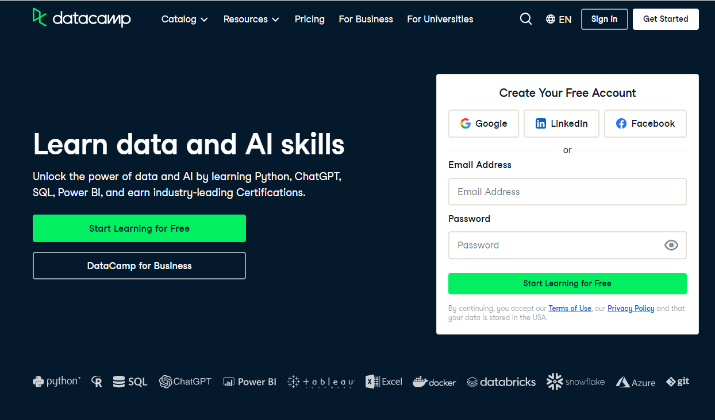DataCamp is one of the most popular online learning platforms, offering a wide range of courses focused on data, programming, and new technologies.
While DataCamp no longer offers completely free courses, they do offer a free plan that allows users to access the first lesson of any course. This is a great way to evaluate the quality of courses before signing up for a paid plan.
So here is a look into some of these DataCamp courses that you can start learning for free and then switch to a paid plan if you are happy with the course offerings.
Let’s dive in!
What is DataCamp?
Before we start talking about the courses, let’s briefly discuss the basics.
DataCamp is an online learning platform that specializes in courses related to data analysis, programming, and career tracks in the field.
With over 427 courses available, DataCamp offers a wide range of topics in data science and programming for learners of all levels.
They are known for their high-quality courses, which focus on practical skills that are essential for data analysis and programming careers.
Whether you want to become a data analyst, data scientist, or pursue any other career in the data and technology industry, DataCamp has the resources to support your journey.
Explore: Are Datacamp Certificates Worth it?
Why Choose DataCamp?
There are several reasons why DataCamp is a top choice for individuals looking to develop their data analysis and programming skills:
- Practical Approach: DataCamp courses focus on practical application, allowing learners to gain hands-on experience and apply their newly acquired knowledge in real-world scenarios. This practical approach ensures that you develop valuable skills that are immediately applicable in your career.
- Career and Skill Tracks: At DataCamp, you can explore various career tracks and skill tracks that guide you towards specific areas of expertise or future careers. They offer 17 career tracks and 51 skill tracks, ensuring that you can find the path that aligns with your interests and goals.
- Expert Instruction: DataCamp courses are created by industry experts and instructors with extensive experience in their respective fields. This ensures that you are learning from knowledgeable professionals who can provide valuable insights and guidance.
Choosing DataCamp is a great way to embark on your data analysis and programming journey and gain the skills you need for a successful career in the data-driven world.
Check out: Udemy vs Pluralsight
Get Started with DataCamp for FREE.The place to learn R, Python & Data Science. Check Special Pricing.
DataCamp Courses
Now let us move on to DataCamp courses that you can start learning for free.
If you find the course engaging and useful, you can subscribe for a paid plan and continue with the course.
And with DataCamp pricing starting as low as $13 per month (if billed annually), you can easily access these high-quality courses without breaking the bank.
By investing in a DataCamp membership, you receive access to the full library of DataCamp courses and can take your skills to the next level.
So, here is a list of the best DataCamp courses that you can start exploring for free:
1. Beginning Bayes in R Course
This course introduces beginners to the Bayesian school of thought in statistics using the R programming language. It covers the basics of Bayesian statistics and provides insights into the theory behind data analysis.
Although it may not have immediate practical applications, it is a valuable course for those interested in advanced statistical analysis.
2. SQL Tutorial for Marketers Course
The SQL Tutorial for Marketers course is designed for individuals in marketing roles who want to learn how to use SQL for data analysis and database management.
With a focus on practical applications for marketers, this course teaches you how to retrieve data from databases and use SQL functions for marketing tasks.
Also read: Best Udemy Alternatives For Data Analytics
3. Introduction to Python for Finance
For those interested in combining their programming skills with finance knowledge, the Introduction to Python for Finance course is an excellent choice.
This course covers the basics of Python programming and delves into specific topics relevant to finance, such as working with financial data, visualizing trends, and performing financial calculations.
4. Introduction to Statistics
This is a comprehensive program designed to provide you with a solid foundation in statistical analysis. A highlight of this course is its integration of R programming, a widely-used language in statistical analysis.
During the course, you will learn how to explore data, interpret correlation and regression analyses, understand probability distributions, construct confidence intervals, and conduct hypothesis testing.
Explore: Datacamp Free Trial
5. Introduction to SQL
The Introduction to SQL course from DataCamp provides a comprehensive overview of SQL fundamentals, essential for business and data analysis.
In just two hours, learners delve into relational databases, SQL basics, querying data, and understanding the differences between popular SQL flavors like PostgreSQL and SQL Server.
The course offers a mix of theory and practical exercises, enabling students to apply their newfound skills immediately in real-world scenarios.
Check out: Best Data Science Bootcamps
6. Introduction to Tableau
The Introduction to Tableau course offers an insight into Tableau’s fundamental concepts and features, including how to load data, workbooks, and create compelling visualizations.
By the end of the course, learners will have the skills to confidently explore Tableau and build impactful data dashboards.
Get Started with DataCamp for FREE.The place to learn R, Python & Data Science. Check Special Pricing.
7. Introduction to Python
The Introduction to Python course from DataCamp provides an extensive overview of Python fundamentals, covering topics such as variables, data types, functions, and data manipulation.
Through this course, learners will gain a solid understanding of Python basics and be able to apply their skills to real-world data analysis and visualization tasks.
Explore: DataCamp vs Codecademy For Python
8. Introduction to Power BI
The Introduction to Power BI course from DataCamp introduces learners to Power BI essentials, including how to load and transform data, create visualizations, and build impactful reports.
In just 4 hours, learners gain a 360° understanding of Power BI’s Data, Model, and Report views, enabling them to confidently navigate the tool and create compelling data visualizations.
9. Understanding Data Visualization
This course explores visualizing complex data using charts, graphs, and maps without coding, emphasizing the selection of the best visualization methods and interpretation of plots.
Learners engage with real-world data sets on various topics like COVID-19 cases to graphically represent data distributions and relationships between variables.
This is achieved through histograms, scatter plots, line plots, bar plots, and more, enhancing their data visualization skills effectively.
10. Data Manipulation in SQL
The Data Manipulation course from DataCamp covers various techniques for transforming and aggregating data using popular libraries like pandas and Alteryx.
Learners gain hands-on experience with data manipulation, including filtering, sorting, and grouping data, as well as advanced methods for handling missing values and optimizing performance.
Read this too: DataCamp Success Stories That Inspire
11. Intermediate Data Modeling in Power BI
The Intermediate Data Modeling in Power BI course from DataCamp extends learners’ knowledge about facts, dimensions, and their relationships in Power BI data models.
It covers advanced topics such as using bi-directional cross-filtering, quick measures, hierarchies, and writing DAX to fully customize data models.
Get Started with DataCamp for FREE.The place to learn R, Python & Data Science. Check Special Pricing.
12. Manipulating Time Series Data in Python
This course covers the basics of working with time series data, including how to use methods built into Pandas to work with dates and times, resample time series to change frequencies, and calculate rolling and cumulative values.
By the end of the course, learners will be able to apply these skills to build a value-weighted stock index from actual stock data.
Also read: Codecademy vs DataCamp vs Dataquest
13. Introduction to NumPy
The Introduction to NumPy course from DataCamp provides a comprehensive overview of NumPy, a fundamental Python package for efficient data science.
Learners gain hands-on experience working with powerful tools in the NumPy array and start exploring data in Python.
14. Data Manipulation with dplyr
The Data Manipulation with dplyr course from DataCamp covers the basics of working with dplyr to transform and aggregate data.
Learners apply these skills to real-world case studies, such as transforming the counties dataset and aggregating data to answer questions about the data.
Check out: DataCamp vs Sololearn
15. Data Analysis in Excel
The Data Analysis in Excel course from DataCamp covers essential data analysis techniques using Excel, including exploring data with PivotTables, applying intermediate logical functions for customer segmentation, and forecasting future trends.
The course is ideal for anyone looking to enhance their data analysis skills using Excel, whether you’re a business analyst, marketing professional, or just want to gain valuable insights from your data.
It provides hands-on exercises with real-world datasets and teaches time-saving shortcuts and essential functions to transform raw data into clear insights.
16. Introduction to Databases in Python
The Introduction to Databases in Python course from DataCamp covers the basics of relational databases and how to interact with them using SQL and the Python SQL toolkit SQLAlchemy.
Learners gain hands-on experience with popular databases such as SQLite, MySQL, and PostgreSQL, learning how to query, build, and write to these databases effectively.
Explore: Udemy vs Coursera vs DataCamp
17. Introduction to Relational Databases in SQL
The Introduction to Relational Databases in SQL course from DataCamp provides a comprehensive introduction to relational databases and SQL, covering topics such as creating tables, specifying relationships, and enforcing data integrity.
By the end of the course, learners gain a solid understanding of SQL relational databases and can apply their skills to real-world data science applications.
Get Started with DataCamp for FREE.The place to learn R, Python & Data Science. Check Special Pricing.
18. Time Series Analysis in SQL Server
The Time Series Analysis in SQL Server course from DataCamp covers essential techniques for preparing, aggregating, and querying time series data using SQL Server.
Learners gain hands-on experience with date and time functionality, converting strings to dates, aggregating data over time, and using window functions for calculations over time.
Read this too: DataCamp For Beginners
19. Data Manipulation with pandas
The Data Manipulation with pandas course from DataCamp teaches learners how to manipulate DataFrames by extracting, filtering, and transforming real-world datasets for analysis using the popular pandas library.
Through hands-on exercises with datasets like global temperature time series, learners master importing, cleaning, calculating statistics, and creating visualizations using pandas to enhance their Python data science skills.
20. Introduction to DAX in Power BI
The Introduction to DAX in Power BI course from DataCamp provides a comprehensive overview of fundamental DAX concepts, including creating calculated columns, measures, and tables.
Learners gain hands-on experience writing DAX code and learn supporting knowledge around context in Power BI, which is crucial for building effective reports.
Conclusion
As you can see, DataCamp offers a range of courses focused on data, programming, and new technologies.
With their free plan, users can access the first lesson of any course. This is a great opportunity for you to get a taste of DataCamp’s high-quality content before going for a premium course.
If you find a course good and want to learn more, you can easily subscribe to the paid plan to get its full access.
With a premium plan, you can dive deeper into the subject, and gain valuable skills that can boost your career prospects.
Rest assured you’ll get full value of your money by investing in any of the DataCamp courses.












